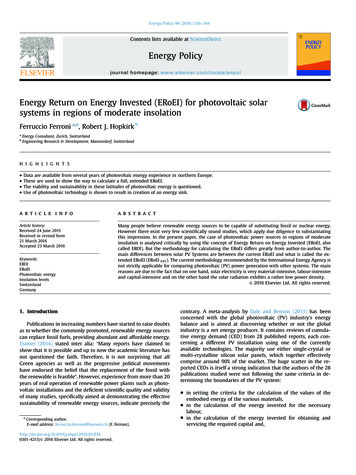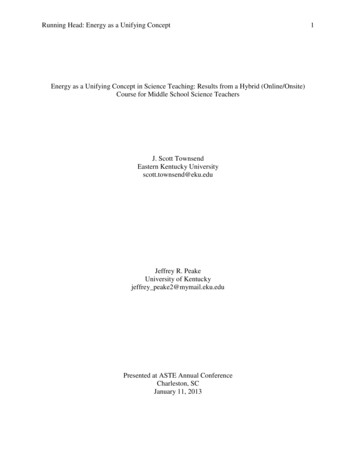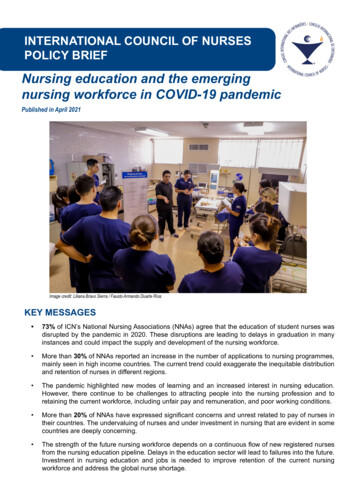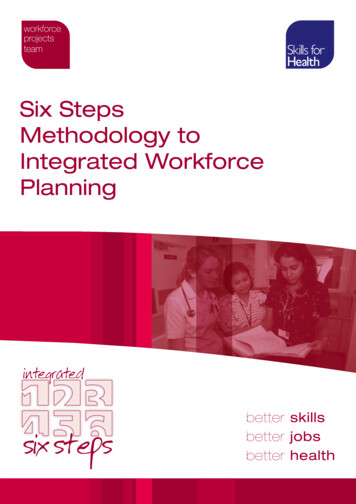
Transcription
Developing an Energy Workforce inIndian CountryBlackfeet Community CollegeWorkforce Development DepartmentAugust 20, 2014
Staff IntroductionsJohn PickensLola WippertCheryl MadmanDr. Cheri Kicking WomanWillie CrawfordSam SalwayBrad Layton
Getting the Grant/NSF Grant/Missoula College Data gathered from the Blackfeet Tribe’s Economic Development Plan, Blackfeet Housing Authority Community NeedsAssessment, Blackfeet Community College’s Community Needs Assessment, and Montana’s Department of Labor &Industry - Montana Employment Projections reflects the need across the Blackfeet Reservation, across the region andacross Montana for immediate training in Building Trades with an emphasis in Solar Electric technology, ComputerTechnology with several certificate emphasis and Pre-Paramedic curriculums. Technical Skills Proficiencies Taught: This program emphasizes the basic construction of Solar Paneling, Solar Electric and Installation and PhaseApplication of construction. Students will be able to work safely on the construction site and apply up-to-dateconstruction methods applicable to utilizing green technology in construction. Industry Certifications, credentials, certificates or degrees students may earn: The Solar Electric certificate program provides the foundation for attaining the solar industry’s standard certificationfrom the North American board of Certified Energy Practitioner (NABCEP). Industry-recognized Standards or competency assessments: Upon successful completion of coursework offered by a registered NABCEP Entry Level Exam Provider, a studentis eligible to sit for one of the Entry Level Exams. Prior to taking the NABCEP PV or Solar Heating Entry LevelExam, students should have demonstrated a basic understanding of the principles outlined in the LearningObjectives
Training the StaffEnergy can transform lives. From turning bread into toast, to moving several-thousandpounds vehicles with ease, to shinning lights in dark corners, the list of ways in whichenergy changes our lives is endless. Every day, each of us relies on some source ofenergy to make our lives easier, more productive and more fun. All energy on planetearth comes from the sun, whether it is from photosynthesized light compressed intothe earth, from wind flowing because of air heated by the sun, or from solar cellsenergized by photons of sunlight. Some of these sources can pollute the earth whileconsumed and some do not. In recent years the topic renewable energy and over allgreen power has captured public awareness.Here at the Blackfeet Community College we are taking steps to reduce the carbonfoot print which is created.Recently Blackfeet Community College was award a grant from the department ofenergy to strive forward in solar industry. It started out with intense on-line class workwhich was provided by Solar International, its home base is in Paonia, Colorado. Online class work was for 6 weeks, with a follow up hands-on lab after completion.
Training the Staff After arriving in Poaina, Co, we meet for classroom instructions and had a choice ofsystems we wanted to work on, such as Low slope roof with Schneider Inverter and ballasted racking Ground mounted array SMA Inverter, commercial style ground mount racking Steep roof array SMA TL inverter, Standard roof mount racking Roof mounts ArrayEnphase micro inverters, Standard roof mount racking Pole mounts (stand-alone) system with Kaco Inverter
Training the Staff Courses studied were, Solar Electric Design andInstallation. (PV 101) On and off grid applications werecovered. Courses content provided a fundamentalunderstanding of concepts necessary to work with PVsystems that included: Systems components and configuration Site analysis and solar resource data PV module specifications and site criteria Mounting solutions Sizing of residential grid-direct systems Overcurrent protection and grounding Safety and commissioning
Training the Staff Enrolled participants also took PV 203. Solar Electric Design(battery-based), this course explored additional design andinstallation considerations to battery- based PV systems. Thiscourse covered step-by-step design processes for battery-basedapplications, this included stand-alone (off- grid) and Grid-tiedwith battery back, and hybrid systems. Topics covered: Load analysis Sizing strategies, and calculations Component selection Battery safety and maintenance Generator integration Commissioning procedures
Training the Staff Lab week( Grid-tied) was filled with hands-on learning, By working insmall groups led by expert PV instructors, students were to put theirclassroom learning from PV 101 to the test, fully installing andcommissioning a variety of system types and a range of components,testing the systems, and evaluating their performance. Lab week (Battery-Based), we learned to safely install, test, andcommission battery-based PV systems, over the course of the week withhands-on installation practice. Lab stations were composed of bothstand-alone and grid tied with battery backup systems, that included bothAC and DC coupled systems. Class concentrated on battery safety,wiring, and maintenance, system components included: combiner boxes,disconnects, power centers, controllers, battery banks, and inverters.
BCC Curriculum CORE 7 – Construction Technology – 22 Credits (Complete the Following) CSTN115 – Construction Calculation & Estimating BGEN105 - Intro to Business ACTG201 - Financial Accounting CSTN148 - Blue Print Reading CSTN295 - Field Work/Clinical/Practicum HHP245 - 1st Aid & CPR Emphasis: Solar Energy PV101 - Solar Electric Design & Installation PV202 - Grid-Direct Design and the NEC PV203 - Battery Based PV Design PV299 - Basic Survey & Soil Analysis CON190 - Special Topics (OSHA 10 – Safety in the Workplace) CON204 - Basic Electrical Fundamentals HHP245 - 1st Aid & CPR
Job Placement/Workforce Dual Enrollment with BHS Blackfeet Housing – new homes/projects BCC Career Center/Internships/ExperientialLearning/Workforce Development Building
The Future First tribal college to have this curriculum Work with other tribal colleges Professional Development for currenttribal/community employees Endless possibilities!!
Questions
Upon successful completion of coursework offered by a registered NABCEP Entry Level Exam Provider, a student is eligible to sit for one of the Entry Level Exams. Prior to taking the NABCEP PV or Solar Heating Entry Level Exam, students should have demonstrated a basic understand











